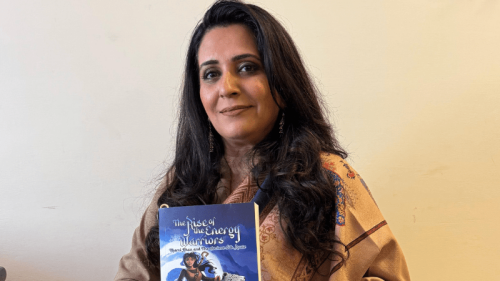
Between the glamour of the Mughal empire and the glory of the British Raj — both amply portrayed in books and films — there is a whole clouded world where the process of fusion of the two civilisations took place, especially in terms of governance and administration of the realm, which remains inadequately explored. Ilhan Niaz has admirably addressed this elusive historical aspect in his book The State During the British Raj: Imperial Governance in South Asia 1700-1947. After all, South Asia had been ruled and controlled by powerful, rich dynasties for centuries, so how had justice been administered, revenues collected, huge armies raised, victories achieved and architectural feats accomplished before the British arrived? How did they transform South Asia afterwards?
In The State During the British Raj, Niaz aims not only to “reflect on that part of South Asia’s history that laid the foundations of modern India and Pakistan and to reintegrate the historical experience of governance in British India”, but also to draw upon his vast insight into global history and the rise and fall of world empires. He enriches this remarkable book with his valuable interpretations and commentary that offer guidance for our present and future navigation in the spheres of social development and governance. He also writes that “the label of ‘Mughal’ applied to the Timurides” is incorrect.
The main premise of the book is that “The most far-reaching and profound aspect of institutional development in British India was the subordination of the sword to the spirit, which is to say the establishment of civilian supremacy. Until British rule, all South Asian states and empires had been military states, in which the army was central to the political and administrative order. The rulers were typically military strongmen and had to be perpetually vigilant when it came to the management of their armies, for the risk of a rival general seizing power or a member of the ruling dynasty gaining the loyalty of a section of the military and trying to overthrow the ruler was ever-present. On this score, Britain’s freakishly different evolution played an important role, since its elites were accustomed to civilian supremacy and saw it as an obvious and desirable aspect of governance.” Niaz expresses the concern that South Asian societies are displaying tendencies of reverting to the pre-British political culture of ‘might is right’.
Ilhan Niaz’s latest book on the background dynamics of the British Raj provides valuable insights into today’s political and social conditions
The author divides his narrative into six illuminating sections that deal with the rise and fall of the house of Timur and the struggle for Timurid imperial succession; the British Indian state and the emergence of civilian supremacy; civilian meritocracy and the higher bureaucracy in British India; law and order and the British empire in India; representation of the Raj and the origin and development of South Asian colonial democracy; and the Raj and the sovereign law in India.

This is a fascinating, detailed historical account of South Asian history before and during the Raj, and after the Raj’s decision to quit India. A most comprehensive book on our history, it provides valuable insight into background dynamics that help in understanding today’s political and social conditions, as well as relations among the successor countries and regions.
Written in a lucid, focused style, the book elaborates on the origin and development of the bureaucracy, military, judiciary, democracy and constitutions, taxation and revenue collection mechanisms as well as the promotion and development of education. Obviously, all these constructive efforts and policies by the Raj were aimed at acquiring a better hold and sustainability for its own rule. Nevertheless, the collateral benefits to indigenous society are irrefutable, irrespective of the fact of what was intended.
The constructive efforts and policies by the Raj were aimed at acquiring a better hold for its own rule. Nevertheless, the collateral benefits to indigenous society are irrefutable.
Challenging the omnipotence of the ruler, the gradual expansion of the concept and practice of representation and ‘one man one vote’, objective meritocracy versus subjective rewarding and awarding of authority and wealth arbitrarily by the ruler, and the recognition of the rights of the minorities and the backward segments of society were new concepts introduced by the colonisers. There is elaborate and intricate research data and economic statistics illustrating the various departments and activities during the period discussed in the book. This also includes the corruption and self-aggrandisement by junior and senior British functionaries, as well as by institutions during the period of the Raj. It is interesting to learn that, initially, commissions in the army were bought rather than gained on merit, and different ranks carried a different price tag for anyone who could pay. The price was often steep, but many ambitious and adventurous Britons were attracted by the prospect of serving in India. The military was not as merit-oriented an institution intellectually as the civil services were required to be.
In a domestic perspective later on, the author infers, “As order breaks down in both India and Pakistan, and the harsh measures taken fail to deliver sustained improvement, both the successor states are in desperate need of a history lesson when it comes to the problem of ‘the peace of the realm’. There is also in this lesson a stark warning that, once order collapses, restoring it requires a level of wisdom and commitment that Indians and Pakistanis with their short-sighted attitude have shown little evidence of possessing.”
Niaz is a professor of history and has authored multiple books, including Old World Empires: Culture of Power and Governance in Eurasia, The Culture of Power and Governance of Pakistan (1947-2008) and An Inquiry into the Culture of Power of the Subcontinent. His work has been published in leading international academic journals. Among other awards, he is also the recipient of the Best Non-Fiction Book award at the 2010 Karachi Literature Festival for The Culture of Power and Governance of Pakistan.
In his conclusion in the last chapter of the book, titled ‘What You Leave Behind’, he refers to the Histories of Herodotus, the Muqaddimah of Ibn Khaldun and Edward Gibbon’s The History of the Decline and Fall of the Roman Empire to write that “... above all else, they reveal that no empire lasts forever, that no military is invincible, that no leader is infallible, and no single ideology has all the answers we need...”
The reviewer is a freelance writer and translator of Freedom of the Press: The War on Words 1977-1978
The State During the British Raj: Imperial Governance in South Asia 1700-1947
By Ilhan Niaz
OUP, Karachi
ISBN: 978-0199408535
312pp.
Published in Dawn, Books & Authors, January 19th, 2020

















































Dear visitor, the comments section is undergoing an overhaul and will return soon.